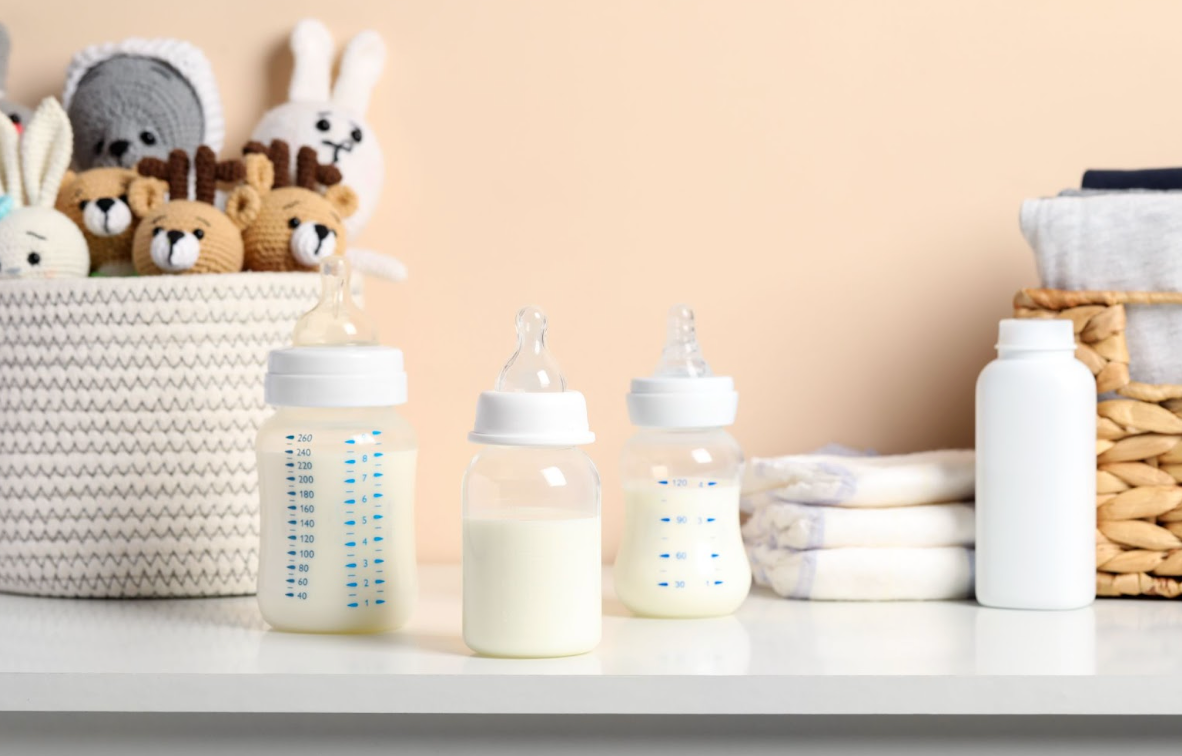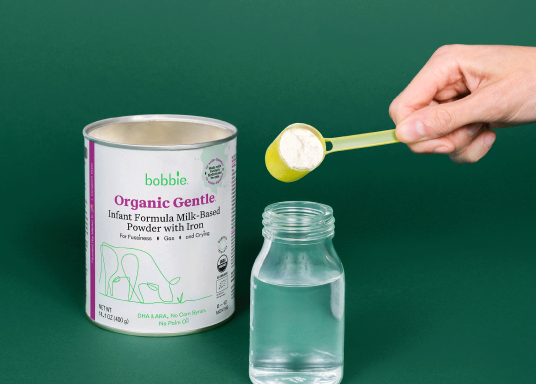Published January 6, 2025

The Impact of Feeding Choices on Postpartum Mental Health
Download the PDF to Learn More.
Welcoming a baby can be a life-altering experience filled with blissful, and, oftentimes, sleepless moments of bonding with your precious newborn. But, it’s also a time of intense emotional, physical, and mental challenges. Feeding experiences — whether breastfeeding, formula feeding or a combination — play a critical role in shaping maternal mental health.
New third-party research commissioned by Bobbie and led by three leading experts in maternal and perinatal health sheds light on the impact of feeding choices. Dr. Ashurina Ream, a licensed clinical psychologist; Dr. Pooja Lakshmin, a board-certified psychiatrist; and Dr. Mona Amin, a board-certified pediatrician and IBCLC (International Board Certified Lactation Consultant), share their perspectives on why it’s time to prioritize supporting mothers, caregivers and families no matter their feeding journey.
The study showed that 86% of mothers who had a baby in the last four years in the US reported feeling frequent or constant negative emotions postpartum. While these findings are completely unacceptable, they are unfortunately, not entirely surprising. And when it comes to asking for support, 61% of mothers felt shame, anxiety or discomfort in turning to their support systems about feeding choices.
Asking for Help
"One of the greatest challenges new moms face is the difficulty of asking for help, despite the toll of the postpartum period,” says Dr. Ashurina Ream. Her work with new mothers often reveals an unfortunate reality: societal pressures, combined with a mother’s own expectations, can intensify feelings of inadequacy. This, in turn, increases the risk of perinatal depression symptoms, postpartum anxiety, social isolation and other struggles for a new mom.
“Our culture places a tremendous amount of pressure on mothers to ‘do it all,’ and that includes how they choose to feed,” Dr. Ream explains. “When feeding plans don’t work out as expected—due to issues like low supply or latch challenges—it’s not just disappointment they feel; It’s a profound sense of failure, even though those circumstances can be largely beyond their control.”
The data supports this: a survey of 1,000 mothers found that 63% experienced moderate to extreme stress over their feeding choices during their baby’s first year. More than half adjusted their initial feeding plan after pregnancy and birth, often experiencing mixed emotions about the change.
According to Dr. Ream, “Normalizing these adjustments and fostering a compassionate dialogue can ease the emotional burden for parents. It’s not about choosing one method over another—it’s about empowering parents to do what works for them.”

Perinatal Mental Health and the Power of Support
According to Dr. Pooja Lakshmin, feeding experiences directly impact how mothers feel in their postpartum journey.
"Feeding is one part of a much larger puzzle when it comes to a new mother's mental health," she says. "What matters most is the context in which decisions are made. Are moms receiving accurate information? Are they being judged or pressured? Do they feel like they have the tools and resources to address the challenges they face?"
Dr. Lakshmin emphasizes that seeking help—whether for feeding, sleep or emotional struggles—should be viewed as an act of strength. "I tell my patients all the time: Asking for support is not a weakness; it’s a skill. That support might include therapy, mommy groups, or medication for postpartum depression or anxiety disorders." It can also mean reaching out for help with mood swings, behavioral health concerns, psychosis, or any other mental health condition a new mom may face.
Importantly, society has a responsibility to destigmatize these tools—as well as discussions around mental health care, perinatal mood disorders and maternal depression—just as we need to normalize all feeding options. “Mothers often carry the weight of judgment from others, but also from themselves. Destigmatizing mental health treatments, including medication, is critically important,” says Dr. Lakshmin.
These findings underscore the importance of providing comprehensive support to new mothers, including affordable access to lactation counseling, mental health services, and community networks. Informing new parents with educational support around feeding is a proven and tangible way to alleviate postpartum stress by empowering mothers with the tools they need to make the best feeding decision for themselves and their family -- whether that's breast, bottle, or a combination of both.
The Role of Pediatric Care in Feeding Choices
Dr. Mona Amin, a pediatrician and IBCLC, sees firsthand how feeding experiences impact the health and well-being of postpartum women. According to her, the focus needs to shift from perfection to personalization.
"When we talk about infant feeding, the conversation often gets stuck on what’s 'best'—as if there's one universal answer for every family. But it’s not a one-size-fits-all scenario,” Dr. Amin explains. “Every family is unique, and what works for one may not work for another. Respecting those differences is key to creating a supportive environment."
The research reflects this diversity: while 79% of mothers ultimately feel good about their feeding choices—whether breastfeeding, pumping, formula feeding or some combination of these options—53% still felt judged or pressured. This tension highlights the gap between mothers’ satisfaction with their decisions and the societal narratives that influence them.
Healthcare providers have a responsibility to help bridge this gap. “When parents come to me with questions about feeding, my job is not to impose or choose a path for them. It’s to listen to their concerns, provide evidence-based information, and help them feel confident in the decisions they’re making for their family.”

Sign up to get the scoop on feeding, sleep, poop, and so much more. By singing up for email, you are to receive marketing emails from Bobbie and can manage your email preferences or unsubscribe at anytime

Your go-to resource for all things new baby.
How We Create Change
The findings from this national survey emphasize the need for systemic changes to better support families during the emotionally-intense postpartum period, including:
-
Normalize all feeding options: Feeding is not a universal choice. Families need to find what works for them, free from judgment.
-
Provide unbiased support: Healthcare providers, lactation consultants, family members and friends should ensure parents feel informed and supported—not pressured or shamed.
-
Prioritize maternal mental health conditions: Mental health care should be integrated into postpartum women’s support, and seeking help—whether through therapy, medication or community — must be celebrated as an act of strength.
Let’s Support Each Other
At its core, supporting mothers is about more than feeding—it’s about fostering a culture of empathy, empowerment, and respect. When we prioritize the perinatal mental health conditions of mothers, we’re not just helping them—we’re improving outcomes for their babies and families.
Parenting is messy and unpredictable. Feeding plans change. Mood swings happen. And that’s completely okay and normal. The more we talk about the realities of postpartum emotional and behavioral health, the more we empower families to face challenges with confidence.
To learn more about the research and Bobbie’s initiatives to support parents and their feeding choices, visit BobbieU.
Seven Letter Insight conducted the nationwide online and randomized text-to-online survey between October 18-28, 2024. The third-party survey was developed and led by Seven Letter Insight data scientists alongside three doctors in the perinatal, pediatric, and maternal wellness space and was commissioned by Bobbie. One thousand (N=1000) women who have given birth within the last four years were surveyed, with a margin of error of +/-3.1%. at the 95% confidence level. The survey was weighted to National Vital Statistics System (NVSS) demographic data available through the Centers for Disease Control’s (CDC) National Center for Health Statistics (NCHS).
The content on this site is for informational purposes only and not intended to be a substitute for professional medical advice, diagnosis or treatment. Discuss any health or feeding concerns with your infant’s pediatrician. Never disregard professional medical advice or delay it based on the content on this page.




































